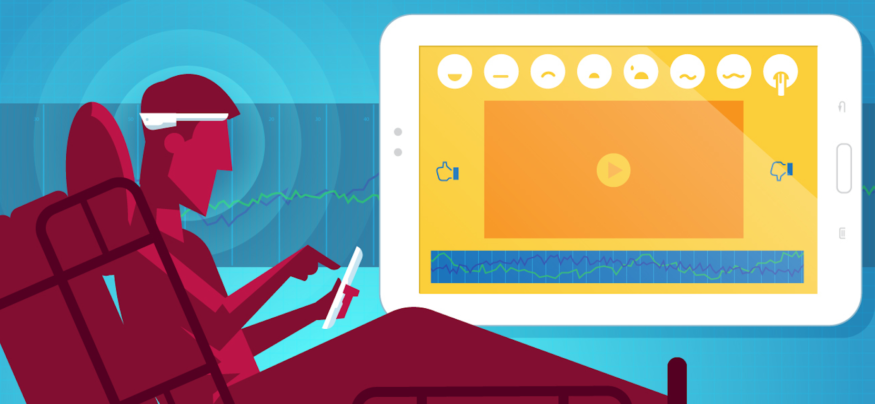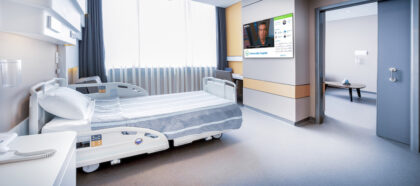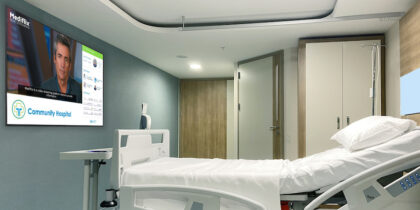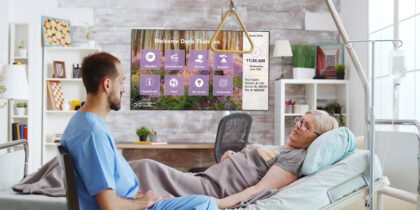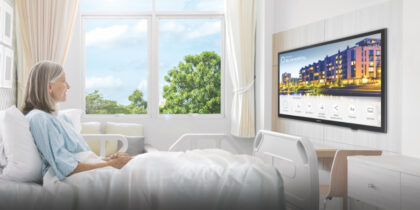Pain is relative. What feels excruciating to one person might simply be an everyday ache for another. While hospital staff can easily measure a patient’s blood pressure, heart rate and temperature, gauging discomfort and offering pain management solutions proves much more challenging.
Typically, healthcare providers have patients rate their pain on a scale of one to 10, or by using a chart with various facial expressions. Using these systems, both patients and hospital staff play a guessing game — one made even harder when dealing with children or adults who can’t communicate.
New pain management technologies are removing some of the guesswork. Southern Hills Hospital in Las Vegas is testing a discomfort management platform called AccendoWave that detects, monitors and reports discomfort through proprietary wireless computing tech embedded in an electroencephalography (EEG) system. The AccendoWave platform, which can be accessed on Samsung Galaxy tablets, also includes diversionary content meant to distract patients by offering something fun to focus on during their hospital stay.
How does this technology work, and what kind of results can Southern Hills expect?
Mobile Pain Management Technologies
The patient wears a headband and earbuds that interact and communicate with the handheld tablet. Using the headband, AccendoWave measures a patient’s brainwaves and translates those results into the standard chart of facial expressions, which is displayed at the top of the tablet screen. If patients disagree with the assessment, they can change the results by selecting a different face. However, according to AccendoWave user surveys, 70 to 75 percent of patients say the technology correctly senses their level of discomfort.
Care providers also get tablets, and can view both real-time assessments and trends in patient discomfort levels. “The technology provides a data point around pain or discomfort that the nurse or physician can use to help patients feel more comfortable,” says Martha Lawrence, CEO of AccendoWave. “Our platform does not diagnose patients or suggest pain management treatment options. But it’s helpful information for clinical staff to have and provides a full picture of how the patient is feeling.”
A Good Distraction
AccendoWave uses Samsung Galaxy tablets to process patient brainwaves and Samsung KNOX helps ensure clinical-grade data security. The devices also come loaded with diversionary content, including games, music, 300 hours’ worth of short video clips and full-length movies. Patients with DIRECTV accounts can also access that content on the tablets.
When patients explore the video clips section, the AccendoWave platform automatically serves up content based on EEG readings. Lawrence explains, “The technology tries to sense the patient’s level of discomfort and identify content that relaxes each individual. Then it changes the content to serve up more of what the patient is really focusing on. The patient can also do a ‘thumbs up’ or ‘thumbs down’ and indicate likes and dislikes, so it factors that in as well.”
The results: Out of 1,100 patients who have experienced the AccendoWave technology, more than 90 percent say they enjoy using it, and 85 percent say it makes them feel more comfortable while in the hospital.
“It’s particularly popular with pediatric patients,” says Lawrence. “Parents tell us their kids forget why they’re there in the first place. And adults are just big children. Being in the ER or on a hospital floor, patients feel very vulnerable. They’re half undressed, don’t feel well, and are out of their comfort zones. Having this technology and companion with them can be very comforting.”
Discomfort Management at Southern Hills
Southern Hills is the fifth deployment for AccendoWave. During the six-month pilot, which will last through April 2016, Southern Hills is offering the technology to patients in both the emergency room and orthopedic unit, as a complimentary and voluntary service.
“Southern Hills Hospital actively seeks to enhance our patient experience by using the most advanced technology to deliver the highest quality of care,” said Adam Rudd, CEO of Southern Hills Hospital, in a press release on the launch of the pilot. “We are proud to be the first and only hospital in Nevada to offer this program free to our patients to improve their discomfort management.”
Want to put your business at the forefront of healthcare technology? Check out Samsung’s line of mobile devices to see how they can drive your business forward.
